SOMEWHERE BETWEEN KEROUAC AND FASTER PUSSYCAT, Canadian writer Brent Jensen continues his tireless journey across the continent—a sprawling campaign of dive bars, cheap motels and Southern record shops—all to promote his self-published rock & roll memoir, No Sleep ‘Til Sudbury. He writes about the experience in a new book, Leftover People, balancing tales of the tour’s debauched escapades from city to city against a darker subtext illuminating the eternal struggle between the head and the heart, and of living in the moment versus living in the past.
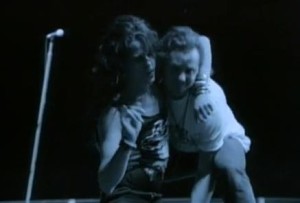 Blaine: Okay, so let’s set this up. You self-publish a memoir about a small-town Canadian boy’s adventures in 80s Metal and Rock. Then you tour the Southern U.S. — in a minivan with a fifty-year old former Poison roadie — to promote the book. Then you write a new book about the tour. The obvious question: Are you nuts?
Blaine: Okay, so let’s set this up. You self-publish a memoir about a small-town Canadian boy’s adventures in 80s Metal and Rock. Then you tour the Southern U.S. — in a minivan with a fifty-year old former Poison roadie — to promote the book. Then you write a new book about the tour. The obvious question: Are you nuts?
Jensen: Maybe a little. When I was approached to do this tour by Chris Long (Poison bassist Bobby Dall’s former personal assistant), my first instinct was to recoil – it was a very unusual proposition and the potential for things to go sideways seemed likely. But the more I thought about it, I figured saying no would almost be foolish. It was a great opportunity for a new writer. I took a common sense approach and set the expectations bar very low. At the very worst, it would be a boozy US road trip seeing some places I had never seen.
The other obvious question: Did you lose a lot of money on the tour?
I wasn’t expecting to make any, that wasn’t what it was about for me. It was more about getting the book out there, and meeting people who had read the book face to face.
Were there times when no one showed up?
Oh yeah. You chalk it all up to a fun experience.
How does this work – do you simply call a bar or record shop and ask if you can do a book signing?
Long booked all of the venues, bless him. The guy is a natural salesman. I was basically just a walk-on. I showed up with books and we just went out there and did it. In hindsight it was an incredibly nervy and presumptuous thing to do, but for the most part it worked. I liked the idea of getting out there in people’s faces to talk about your book, rather than sitting at home and trying to promote it over the internet. But this would only work in a rock and roll-type context. Romance novelists and YA writers may not be able to pile into a van together and criss-cross the American South hocking their books in bars. By the way, a barmaid in your neck of the woods talked me into tasting moonshine.
How was it?
That stuff was awful. It was in a clear bottle behind the bar marked with three big black Xs on it, so I probably should have known better.
If you drank shine in a bar, it wasn’t moonshine. It was saloonshine. Trust me, I’m a Tennessean. True shine is smooth, like cider.
Well, forgive me for being skeptical about that.
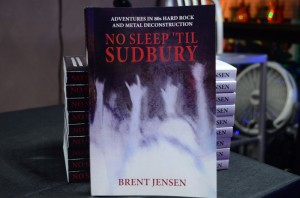 Give us a quick summary of the first book, No Sleep ‘Til Sudbury.
Give us a quick summary of the first book, No Sleep ‘Til Sudbury.
I felt like Dave Ling nailed it on his blog when he said No Sleep is the story of a man trying to reassess his life through his record collection. The book is essentially the result of me looking back on all of the old hard rock and metal bands from my teenage years and considering the significance of the emotional investment I made in that music growing up as an isolated kid. The book is a commemoration of this idea, but No Sleep also looks back on those times and asks: “Why not Springsteen? Why not Culture Club?” The music we loved so intensely as kids was a very telling blueprint of who we were as people, and maybe even who we still are.
What do you mean by blueprint?
In high school the music we listened to seemed like brand advertising for the type of person we were. But more realistically, it was used to portray the type of person we wanted others to think we were. Happy kids listened to happy Wham! Songs, and that’s as far as it went. Metal fans tend to have a more intensely personal relationship with the music, and they really use it to project a message to the rest of the world.

You wrote both books by yourself. No editorial help, nothing. All DIY.
Yep. When I first started writing, I was contributing pieces to pop culture webzines and I guess I developed an aversion to editors because it felt like they were editing just for the sake of it. My work would come back to me and it felt like it wasn’t really mine anymore. After a while I took the Fran Lebowitz approach to editing – my work is my own, refined and refined over and over again, maybe with some insight from trusted friends.
What have you learned about self-publishing?
It felt like a less-desirable Plan B when I first started out, but I changed my mind as I learned more about the reality of the publishing industry. I like that I retain creative control. Obviously the marketing and distribution a major publisher can afford you is likely better than anything you can do yourself, but I don’t mind going out and setting up appearances on my own. It forces me to have skin in the game if I want to get anywhere. And after a while, outlets will start coming to you asking for the appearances. It’s like anything, really – you get out of it what you put into it.
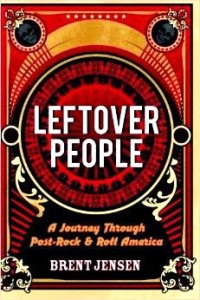 Self-publishing is a great theory but I don’t see one in a hundred that comes close to working. I read Leftover People thinking, “How is he pulling this off?”
Self-publishing is a great theory but I don’t see one in a hundred that comes close to working. I read Leftover People thinking, “How is he pulling this off?”
Not an easy question to answer. I read quite a lot as a kid – I can tell you anything you need to know about Joe and Frank Hardy, and maybe a bit about Nancy Drew too. I think having developed an appreciation for writing at a young age likely helps. The pick and shovel stuff is important too. When you take the time to go over the writing again and again, you’ll always come up with new ideas that will improve the work – whether it’s working out the phrasing, considering word choice, whatever. You’re constantly making the work better and stronger with continued revision. Writing is really no different from painting in that regard – even when you think you may be, you’re never really finished.
Okay, let’s get to the fun rock & roll stuff.
All right…
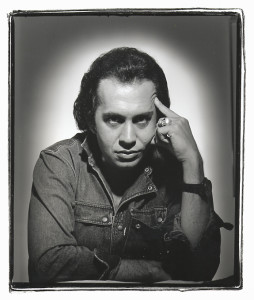 So you meet Gene Simmons.
So you meet Gene Simmons.
Yeah, kind of. This story is told in detail in the book, but the abridged version is that I met Simmons at a book signing (his, not mine!), and while I was in line I was trying to come up with something to say to him beyond the stuff he heard all the time, like “I love you, man!”. I decided to reference the lyrics from the KISS song, “Great Expectations”, and tie it in to the situation at hand.
Remind me of those lyrics?
“…and in the din it seems I’m a million miles away.”
He didn’t make the connection and responded “I’m sorry, I don’t have anything equally philosophical for you, it’s been a long night”. The irony was that as much as I tried to differentiate myself from the typical hyper-emotional fan, I was increasingly freaked out by the fact that I was standing in front of Gene Simmons himself, y’know? So as we shook hands right before I was moved along in the line, I did the thing I tried so hard not to do — I put my hand on his, looked deep in his eyes and said, “I love you, man!” I couldn’t help myself.
I love that story.
Well, the rest of that song was typical Simmons sexual metaphor schlock – “and you watch me singing my song, and you know what my mouth can do…”. That one line about being a million miles away and yet right there somehow, emphasized by the unusually pallid tone of the song and way Simmons sang it, really resonated with me as I sat in front of the stereo and listened so intently as only a curious, stimulus-deprived kid can do. Remember that KISS video for “I Love It Loud”, the one where the kid is completely transfixed to the point where he was zombie-like? That was me listening to KISS records as a kid. Honestly.
Dude, that was all of us listening to KISS as a kid. Hey, at least you didn’t quote the ‘watching your mouth’ line to him.
Ha! That’s the interesting thing about KISS fandom back then. “Great Expectations” is so blatantly sexual and yet a nine year old kid found something in there powerful enough that allowed him to connect with the band. Because we NEEDED to. Those MFs were genius.
Oh man, how many times did I cluelessly sing “Rocket Ride” in front of my mom?
Exactly.
We talk a lot about the giants — KISS, Guns N Roses, Def Leppard — Give me your three favorite not-so-well known metal bands. Mine are 1) Tesla 2) Jackyl and 3) Krokus.
I have about thirty-four of these, but the first three that come to mind are 1) Malice 2) Underdog and 3)Metal Church
Oh man, Malice. I totally forgot about them. So metal. I gotta slip their video into this piece.
In both books you talk about the difference between Heavy Metal and Hard Rock. Just for sport, can we give it a go?
Absolutely!
Here’s my take: Hard Rock is blues-based, emotion over aptitude, groove trumps precision. Metal is more classically influenced — more Mozart and Wagner than Chuck Berry. AC/DC is hard rock. Iron Maiden is metal. This theory is obviously flawed. Sabbath is blues-based but there’s a lot of minor key wizardry and toccata and fugue. RUSH is skillful, intricate and they have song titles like “By Tor & the Snow Dog”– but Rush is not metal. Edward Van Halen is a classically influenced player –technical fireworks over emotion — but Van Halen is clearly a hard rock band if for nothing else but what Michael Anthony brings to the table. Judas Priest, whom we could very well call the prototypical metal band, once insisted that they were not metal but rather rock and roll. It can really be quite confusing.
![JudasPriest-TurboLover[Promo]](https://www.theweeklings.com/wp-content/uploads/JudasPriest-TurboLoverPromo1-300x82.jpg) That initial theory may be flawed, but only because the one rule that applies in rock and roll is that there are no rules. In No Sleep, I followed the line of reasoning you just outlined only as far as it could be disproven at any point. What I mean is that I used an almost algorithmic approach in assessing these bands using all of the factors that distinguish heavy metal and hard rock as checkpoints. Of course, there are sketchy spots – for example Ratt using a chugging, staccato metal-style riff in a pop song like “Round & Round”. When Ratt first started out, they were much heavier and they did dress the part with the leather and studs and everything. All of those bands did that – Def Leppard, Poison, Motley, you name it. I sum up the whole assessment by postulating that the one representative factor that will tell you if a band is metal or hard rock is really the attitude they convey. Van Halen’s first two records leaned pretty heavily on those raw staccato guitar riffs, but everyone knew they weren’t metal because they could swing. Judas Priest didn’t ever swing, even when they added that faux-reggae intro to “The Rage” from British Steel. It all boils down to attitude.
That initial theory may be flawed, but only because the one rule that applies in rock and roll is that there are no rules. In No Sleep, I followed the line of reasoning you just outlined only as far as it could be disproven at any point. What I mean is that I used an almost algorithmic approach in assessing these bands using all of the factors that distinguish heavy metal and hard rock as checkpoints. Of course, there are sketchy spots – for example Ratt using a chugging, staccato metal-style riff in a pop song like “Round & Round”. When Ratt first started out, they were much heavier and they did dress the part with the leather and studs and everything. All of those bands did that – Def Leppard, Poison, Motley, you name it. I sum up the whole assessment by postulating that the one representative factor that will tell you if a band is metal or hard rock is really the attitude they convey. Van Halen’s first two records leaned pretty heavily on those raw staccato guitar riffs, but everyone knew they weren’t metal because they could swing. Judas Priest didn’t ever swing, even when they added that faux-reggae intro to “The Rage” from British Steel. It all boils down to attitude.
To me the quintessential metal song is something like Dio’s “Holy Diver”. It makes you want to strap on a loincloth and storm the castle swinging a sword, you know? The perfect example of hard rock is “Stranglehold”. All groove and attitude. Like it’s midnight Saturday and you’re driving some strange chick’s Camaro a hundred miles an hour with the windows down and no lights on. That’s the difference between metal and rock. One’s a sword and castle and the other is chicks and Camaros. Okay, your turn — three examples of the quintessentially metal song and three of classic rock.
Love Child – Accept
Screaming for Vengeance – Judas Priest
Fight Fire with Fire – Metallica
You Shook Me All Night Long – AC/DC.
Back in the Saddle – Aerosmith
Everybody Wants Some – Van Halen
Why are metal fans so devoted?
I think heavy metal’s central allure is that it provides listeners with completely unrealistic solutions to very real social problems. Above all, metal is escapist fantasy. Most fans love this music so much because of the intense identification that develops when they project their own life situations against the sound, the look, and the feeling of the songs. The songs provide security and comfort in connectivity and relation. Maybe a strength replaces a weakness. And so an emotional bond is formed. In Leftover People I encountered some of these folks as adults, still completely into the music they were so emotionally connected with in the 80s as if no time had passed whatsoever. My interactions with these people forced me to ask myself some hard questions about where I myself stood in all of this as an individual. And without giving too much away, I’ll say this – as rock fans, rock writers, all of it – I think we’re really all leftover people, all just trying to find our way.
The Music Editors have waited a long, long time to put together a playlist like this. These songs are best listened to at top volume from a car stereo in a parking lot with a trunk full of beer and thirty of your closest friends.

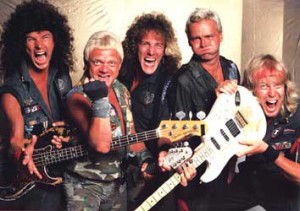
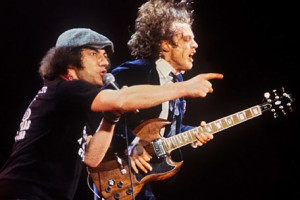
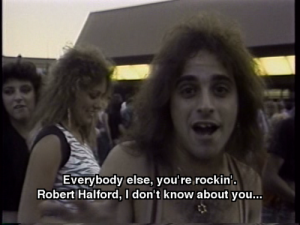


It’s hard to find educated people in this particular
subject, however, you seem like you know what you’re
talking about! Thanks
I’m available for university lectures on the merits of Krokus & Vixen.